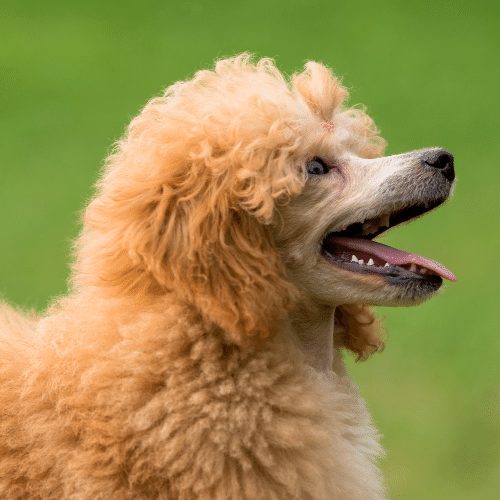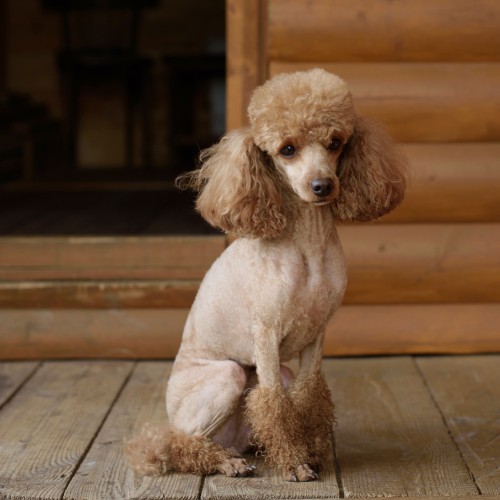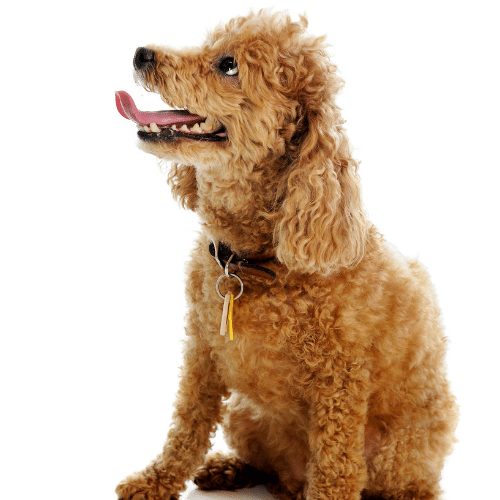Apricot Poodles
March 14, 2021 2022-03-09 6:25Apricot Poodles are one of the most popular Poodle colors. Apricot appears in all three sizes of Poodles: Standard, Miniature and Toy. The beautiful shade as well as the rarity of this color makes apricot Poodles highly sought-after. Today we will look at this type of Poodle as its characteristics.
Table of Contents


Coloring
Apricot Poodles’ color is often confused with cream and red. Even AKC Poodle breeders sometimes categorize their dogs under the wrong color.
Apricot is a dilution of brown. Ideally it should appear to be a bright, sunny color. Apricot is difficult to breed for as it is a recessive gene and it quickly fades in UV light. If your Poodle spends a lot of time outside, his apricot color will soon look like a lighter cream color.
The nose and eye rims of an apricot Poodle should ideally be black or dark brown. A medium-colored brown is accepted as per the breed standard, but not encouraged.
History of apricot-colored Poodles
Poodles have been around for a long time. Some paintings show Poodles in the 15th and 16th century. Back then, most Poodles would have been white or parti-colored. The first apricot Standard Poodle puppy was born in 1898 and was named Sowden Yellow Gall. The new color quickly became popular and was bred mainly in the UK. It would take a while before the color became prevalent in the other Poodle varieties though: Only in 1912, the first apricot Miniature Poodle was born.
In the 1930s, Poodles became more and more popular in North America and have been a beloved companion dog ever since. Due to the rarity of the apricot color and its recessive nature, not a lot of Poodles are available in this color!

Are apricot Poodles rare?
Yes – apricot Poodles are very rare! As a recessive color, apricot is only shown in a puppy if both parents carry a copy of the gene. Most Poodles are black or white (with the occasional Parti Poodle who has two colors). Other Poodle colors such as red, cream, blue or brown are allowed by the breed standard but less common.
The apricot Poodle is very rare among the Poodle colors, which makes these dogs very sought-after (and potentially pricey).
Some puppy buyers have to be on a waitlist for an apricot puppy for months or years. You should only decide for these dogs if you are willing to be patient and wait for your perfect apricot puppy for a long time.
Health & Care
You will care for your apricot Poodle the same way you would for any other coat color. The shade of your dog’s coat has no impact on his temperament, behavior or health.
As all Poodles, apricot Poodles have a tendency to develop gastrointestinal issues. You should only feed your dog high-quality food and make sure that you take him to the vet if he shows any signs of diarrhea or vomiting.
Like all Poodles, apricot Poodles are highly intelligent and will require daily exercise and training. You should never skip out on your Poodle’s activity. A bored and under-exercised Poodle will quickly develop a range of unwanted behaviors, such as reactivity, incessant barking or chewing of furniture.
Grooming your apricot Poodle
Every color Poodle will require regular, consistent grooming efforts in order to keep the coat beautiful and the skin healthy. Letting your Poodle develop mats will lead to hot spots and can even cause severe skin infections. You need to brush your Poodle every day. He should also be bathed with a Poodle-specific shampoo about once a month. Many Poodle owners choose to have this done by a professional groomer.
Depending on whether you want to show your Poodle or not, you can keep his coat either in a full show groom or a more convenient haircut. The teddy bear cut is very popular especially for Miniature Poodles.
Training
Poodles are generally easy to train as they are highly intelligent and love to work together with their owner. They excel at a variety of dog sports, such as agility, competition obedience, disc dog or dock diving. Some owners find their Poodle’s energy needs difficult to manage. Especially for those dogs, participating in a weekly dog sport will be very beneficial.
If you choose to show your dog in AKC conformation events, you will need to train them to show well in the show ring. This includes walking and trotting on the leash and standing still while the judge examines your dog.
The most common behavioral problems in apricot Poodles are anxiety, nervousness and excessive barking. Poodles in general can have “weak nerves” and tend to be easily excited and stressed. Extensive socialization is necessary to turn them into well-mannered and calm companions. This includes positive exposure to people, dogs, different places and a variety of sounds.
Poodles can show prey drive. Do not underestimate that and make sure to teach your dog impulse control and recall skills. This is especially important if your Poodle is sharing your home with smaller animals, such as cats.

How much do apricot Poodles cost?
Most Standard Poodles cost around $800-1,500. Miniature and Toy Poodles are slightly more expensive, ranging from $1,000 to over $2,000. As a rare color, you can expect to pay more for an apricot Poodle of either size.
Apricot Standard Poodles may run up to $2,000 while apricot Miniature and Toy Poodles can be as expensive as $3,000.
The Bottom Line
Apricot Poodles are very popular due to their unusual coloring and their rarity. Many owners are drawn to this special kind of Poodle because they are so unique. It is important to not let rarity alone be a deciding factor when it comes to picking your future puppy though! You should never buy any dog (Poodle or not) for his color alone.
Apricot Poodles will require the same care, grooming, training and exercise as any other kind of Poodle. Due to the at times nervous nature of this breed, it is really important that they are well-socialized and get a lot of positive exposure, especially during their puppyhood. Apricot Poodles excel at a variety of dog sports and will love to participate in those with their owner!
Due to the limited supply of apricot Poodles, expect to be put on a waitlist for a potential puppy. The price will likely be higher than that for a more common Poodle color as well. Being patient pays off though: These dogs are amazing companions that will brighten up every day!

